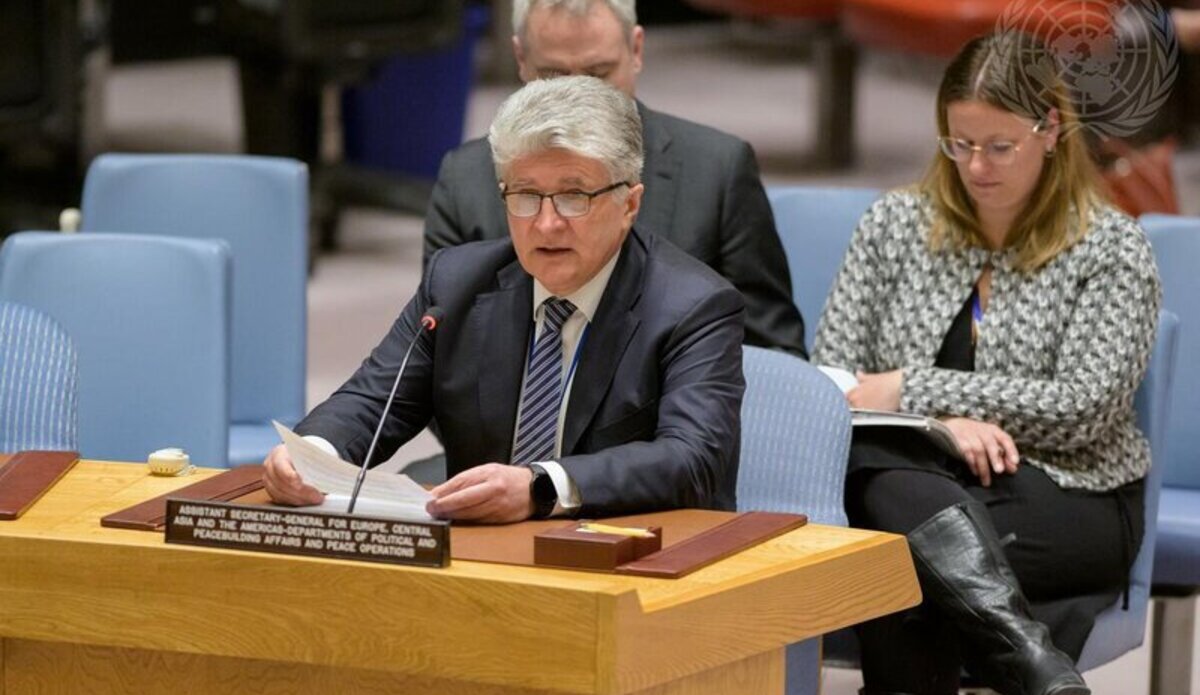REMARKS TO THE SECURITY COUNCIL ON
NON-PROLIFERATION/DEMOCRATIC PEOPLE'S REPUBLIC OF KOREA
BY ASSISTANT SECRETARY-GENERAL FOR
EUROPE, CENTRAL ASIA AND THE AMERICAS FOR
DEPARTMENTS FOR POLITICAL AND PEACEBUILDING AFFAIRS
AND PEACE OPERATIONS MIROSLAV JENČA
New York, 20 March 2023
Mr. President,
According to its official news agency, the Democratic People’s Republic of Korea (DPRK) conducted what it described as an intercontinental ballistic missile launching drill on 16 March. The DPRK announced that the ballistic missile – which it designated as Hwasong-17 - flew a distance of 1,000 km and to an altitude of 6,045 km.
The DPRK also launched a short-range ballistic missile on Sunday (local time). The DPRK characterised this launch as being part of a quote “drill simulating a nuclear counterattack” end quote. This was the fourth event in eleven days in which the DPRK carried out launches using ballistic missile technology. The DPRK has conducted a total of 14 launches of such systems in 2023.
The DPRK greatly increased its missile launch activities in 2022, including approximately 70 launches using ballistic missile technology. The DPRK characterised these launches as involving systems with nuclear weapon roles, including so-called “tactical” nuclear weapons. Most of the systems it tested are capable of striking countries in the immediate region. The systems it tested on 16 March and 18 February, as well as on two occasions last year, are capable of reaching most points on the Earth.
The DPRK again did not issue airspace or maritime safety notifications. Unannounced launches represent a serious risk to international civil aviation and maritime traffic.
Mr. President,
The Secretary-General strongly condemns the launch of yet another ballistic missile of intercontinental range by the DPRK, as well as its other launches using ballistic missile technology.
The Secretary-General reiterates his calls on the DPRK to immediately desist from taking any further destabilising actions, to fully comply with its international obligations under all relevant Security Council resolutions, and to resume dialogue leading to sustainable peace and the complete and verifiable denuclearization of the Korean Peninsula.
Mr. President,
The DPRK is actively pursuing its nuclear weapons programme. In September 2022, the DPRK approved a new law which set out conditions in which it could use nuclear weapons, including pre-emptively in certain circumstances. This nuclear doctrine was reiterated in the official newspaper of the Workers’ Party of Korea (Rodong Sinmun) on 17 March.
The Director General of the International Atomic Energy Agency (IAEA) reported on 6 March that the Punggye-ri Nuclear Test Site quote “remains prepared to support a nuclear test” end quote. The IAEA has continued to observe activity at the site. It has also observed construction activities at the Yongbyon nuclear facilities as well as indications that the 5-megawatt nuclear reactor was operating.
A seventh nuclear test would be a flagrant violation of Security Council resolutions and undermine the international norm against nuclear testing. The Secretary-General remains firmly committed to achieving the goal of a world free of nuclear weapons.
Mr. President,
As per our earlier briefings to this Council, the DPRK continues to implement its five-year military plan unveiled during the 8th Party Congress in January 2021. That plan provided for development of new solid propellant intercontinental-range ballistic missiles; multiple warheads; better warheads; tactical nuclear weapons; a military reconnaissance satellite; new unmanned aerial systems; a 15,000 km-range intercontinental ballistic missile; and a “hypersonic gliding flight warhead”.
Mr. President,
The DPRK has clearly stated its intention to continue pursuing its nuclear weapons and ballistic missile programmes, in violation of relevant Security Council resolutions. The situation on the Korean Peninsula continues to head in the wrong direction. Tensions continue to increase, with no off-ramps in sight.
The Secretary-General remains deeply concerned over the divisions that have prevented the international community from acting on this matter, as well as on other threats to peace and security around the world.
The Korean Peninsula must be an area for cooperation. Today’s meeting provides an opportunity to discuss practical measures for achieving a peaceful, comprehensive, diplomatic, and political solution to the situation on the Korean Peninsula.
Mr. President,
As previously stated, as the Council considers its options, there are several practical measures that could reduce tensions.
First, the DPRK needs to take immediate steps to resume dialogue leading to sustainable peace and the complete and verifiable denuclearization of the Korean Peninsula. This should include the DPRK refraining from carrying out further launches using ballistic missile technology or nuclear tests.
Second, communication channels must be enhanced, particularly military to military. Reducing confrontational rhetoric will help to lower political tensions and create space to explore diplomatic avenues.
Mr. President,
Separately, I wish to highlight once more our concerns regarding the humanitarian situation in the DPRK. The United Nations is ready to assist the DPRK in addressing medical and other basic needs of vulnerable populations. We reiterate our call on the DPRK to allow the unimpeded entry of international staff, including the Resident Coordinator, and of humanitarian supplies, to enable a timely and effective response.
Mr. President,
Let me close by reiterating that the unity of the Security Council on the DPRK is essential to ease tensions and overcome the diplomatic impasse. The primary responsibility for international peace and security rests with this Council. The Secretariat is your partner in this effort.
Thank you, Mr. President.

